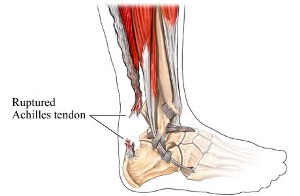What is Achilles Tendon Rupture? How to manage it? What are the precautions to be taken? What are the signs and symptoms? What is the cause of this disease? How to treat it? How can homeopathy help you? All of this answered, in this post and of course our doctors always there to help you. Just fill in your details in the form down below and we will answer all your questions for FREE!

What is achilles tendon?
The Achilles tendon is a band of hard fibrous tissue that connects the calf muscles to the heel bone. Achilles tendon is also known as calcaneal tendon.
What is Achilles Tendon Rupture?
Rupture of the Achilles tendon is a common injury in healthy, young and active individuals. The rupture is spontaneous. Achilles tendon rupture occurs just a few centimeters above the heel bone. Achilles tendon rupture is described as an abrupt break with instantaneous pain which is felt in the foot or heel area. The pain may radiate along the back of the leg and is often intense.
Sometimes the tendon does not fully rupture but only a partial tear develops. The Achilles tendon rupture occurs just above the heel but it may occur anywhere along the length of the tendon.
Advanced age, poor conditioning, and overexertion during exercise. In most of the cases, the individual rapidly performs activity like running or standing on the toes which generates an intense force on the tendon leading to the rupture of the tendon.
Who are more prone to achilles tendon rupture?
It is commonly observed in an individual who is 24-45 years of age. It is more common in men but the incidence of Achilles tendon injury is increasing in the population. Injury to the Achilles tendon is most common in the athlete.
Why does achilles tendon occur?
Achilles tendon is usually injured by sudden plantarflexion or dorsiflexion of the ankle, or by forced dorsiflexion of the ankle outside its normal range of motion. Other causes also include:
– Excessive activity or overuse.
– Flat feet
– Poorly fitting or inadequate shoes.
– Inadequate warm-up.
– Jogging or running on hard surfaces.
– Older recreational athlete.
– Previous Achilles tendon injury.
– Repeated steroid injections.
– Sudden changes in the intensity of exercise.
– Trauma to the ankle.
– Use of antibiotics
– Tense calf muscles prior to exercise.
– Weak calf muscles.
What are the symptoms of the achilles tendon rupture?
– Patient complaining of a sudden snap in the back of the leg. The pain is often intense.
– Swelling around the calf may occur.
– With a complete rupture, people will not be able to climb stairs, run or stand on their toes.
How long does it take for a strained Achilles tendon to heal?
Generally strained achilles tendon takes 4 to 6 weeks to heal.
Can Achilles tendon tears heal on their own?
In mild cases, it can take weeks to months of rest for the tendon to repair by itself.
How can we diagnose achilles tendon rupture?
When an Achilles tendon rupture occurs the clinical confirmation of tenderness and bruising around the heel. The individual with full-blown rupture of the tendon are unable to stand on their toes.
The radiological tests are there to diagnose Achilles tendon rupture are:
*X-ray – X-ray of the foot reveals swelling of the soft tissues around the ankle, other bone injury or tendon calcification.
*Ultrasound – For partial tear of the Achilles tendon the diagnosis can be done by ultrasound. It is a relatively inexpensive, fast and reliable test.
*MRI – It is an excellent imaging test to assess for presence of any soft –tissue trauma or fluid collection. MRI can help to detect the presence of tendon thickening, bursitis and partial tendon rupture.
What is the treatment for achilles tendon?
For complete tear of the tendon surgery is recommended. For partial tear, non-surgical treatment is recommended. Selection of treatment depends on the patient, age, level of activity and other risk factors.
What are the complications of achilles tendon?
If a complete rupture of the Achilles tendon is treated by non- surgically, the risk of rupture is anywhere from 20% -40%. Other complications are skin sloughing, wound infection, nerve damage and protracted recuperation period.
What preventive measures are to be taken in achilles tendon?
To prevent Achilles tendonitis the following tips are:
-Avoid activities which have enormous stress on the heel.
-Stop all the activity if there is pain at the back of the heel.
-Wear proper shoes.
-Gradually strengthen calf muscles with sit –ups.
-Always warm up with stretching exercise before any activity.
What is the prognosis of Achilles tendon rupture?
When proper treatment and rehabilitation are undertaken, the prognosis is excellent. However, those undergo non-surgical care should be aware of recurrence of tendon rupture is higher than surgical therapy. One who develop pain at the back of the heel during sporting activities, it is highly recommended that one should wear proper fitting shoes and discontinue the exercise if pain persists.





